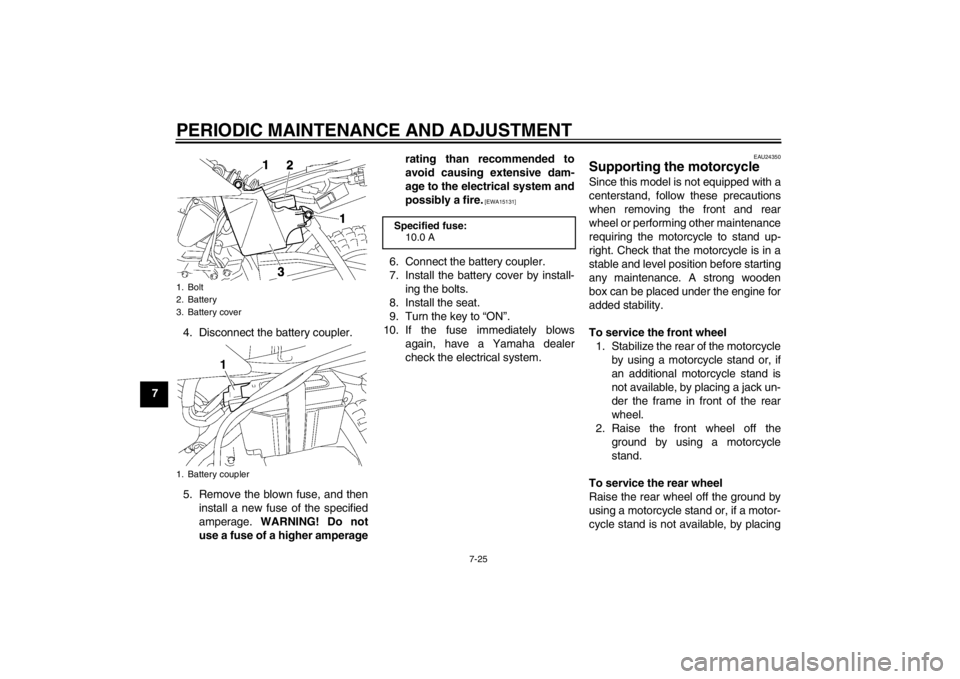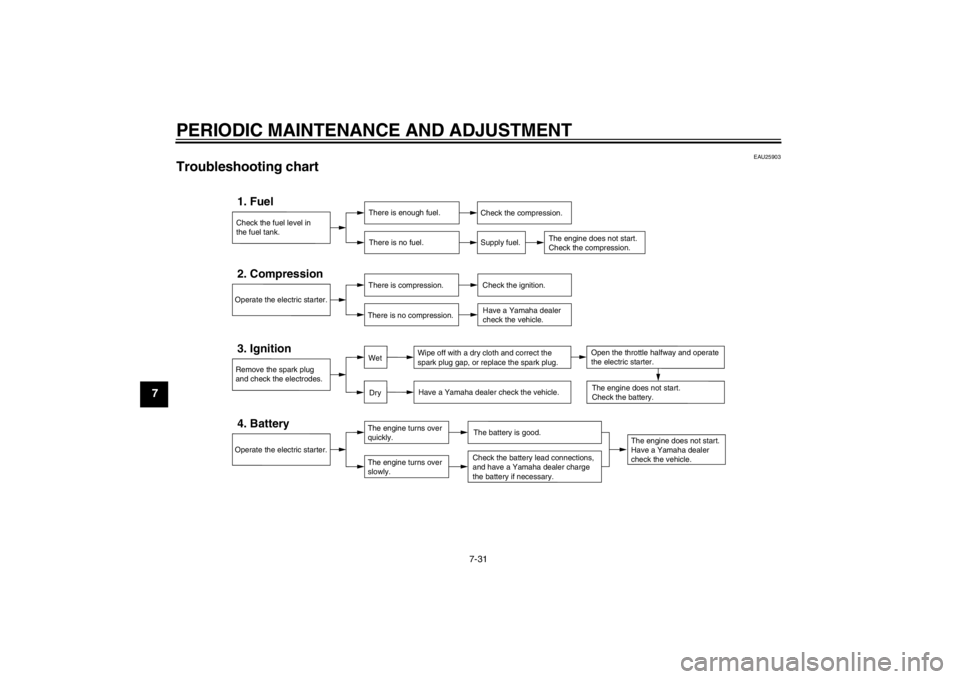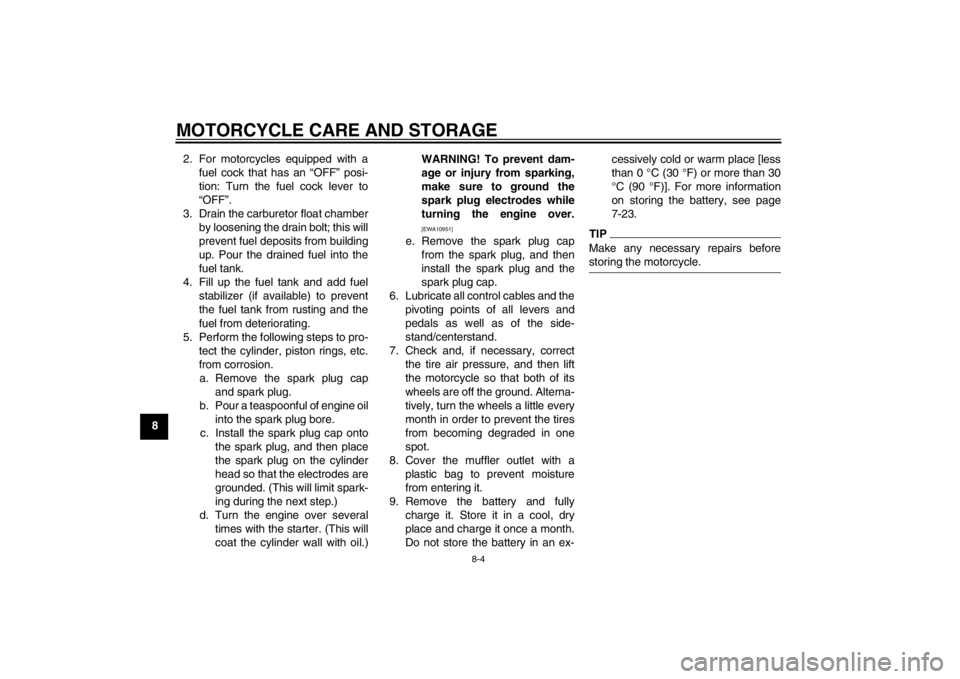check engine YAMAHA TTR50 2013 Owner's Manual
[x] Cancel search | Manufacturer: YAMAHA, Model Year: 2013, Model line: TTR50, Model: YAMAHA TTR50 2013Pages: 86, PDF Size: 1.8 MB
Page 68 of 86

PERIODIC MAINTENANCE AND ADJUSTMENT
7-25
74. Disconnect the battery coupler.
5. Remove the blown fuse, and then
install a new fuse of the specified
amperage. WARNING! Do not
use a fuse of a higher amperage rating than recommended to
avoid causing extensive dam-
age to the electrical system and
possibly a fire.
[EWA15131]
6. Connect the battery coupler.
7. Install the battery cover by install-
ing the bolts.
8. Install the seat.
9. Turn the key to “ON”.
10. If the fuse immediately blows again, have a Yamaha dealer
check the electrical system.
EAU24350
Supporting the motorcycle Since this model is not equipped with a
centerstand, follow these precautions
when removing the front and rear
wheel or performing other maintenance
requiring the motorcycle to stand up-
right. Check that the motorcycle is in a
stable and level position before starting
any maintenance. A strong wooden
box can be placed under the engine for
added stability.
To service the front wheel1. Stabilize the rear of the motorcycle by using a motorcycle stand or, if
an additional motorcycle stand is
not available, by placing a jack un-
der the frame in front of the rear
wheel.
2. Raise the front wheel off the ground by using a motorcycle
stand.
To service the rear wheel
Raise the rear wheel off the ground by
using a motorcycle stand or, if a motor-
cycle stand is not available, by placing
1. Bolt
2. Battery
3. Battery cover
1. Battery coupler
1
Specified fuse: 10.0 A
U2CJ80E0.book Page 25 Tuesday, June 12, 2012 11:15 AM
Page 74 of 86

PERIODIC MAINTENANCE AND ADJUSTMENT
7-31
7
EAU25903
Troubleshooting chart
Check the fuel level in
the fuel tank.1. Fuel
There is enough fuel.There is no fuel.
Check the compression.
Supply fuel.
The engine does not start.
Check the compression.
Operate the electric starter.2. Compression
There is compression.
There is no compression.
Check the ignition. Have a Yamaha dealer
check the vehicle.
Remove the spark plug
and check the electrodes.3. Ignition
Wipe off with a dry cloth and correct the
spark plug gap, or replace the spark plug.
Have a Yamaha dealer check the vehicle.
The engine does not start.
Have a Yamaha dealer
check the vehicle.
The engine does not start.
Check the battery.
Operate the electric starter.4. Battery
The engine turns over
quickly.
The engine turns over
slowly.
The battery is good.Check the battery lead connections,
and have a Yamaha dealer charge
the battery if necessary.
DryWet
Open the throttle halfway and operate
the electric starter.
U2CJ80E0.book Page 31 Tuesday, June 12, 2012 11:15 AM
Page 78 of 86

MOTORCYCLE CARE AND STORAGE
8-4
82. For motorcycles equipped with a
fuel cock that has an “OFF” posi-
tion: Turn the fuel cock lever to
“OFF”.
3. Drain the carburetor float chamber by loosening the drain bolt; this will
prevent fuel deposits from building
up. Pour the drained fuel into the
fuel tank.
4. Fill up the fuel tank and add fuel stabilizer (if available) to prevent
the fuel tank from rusting and the
fuel from deteriorating.
5. Perform the following steps to pro- tect the cylinder, piston rings, etc.
from corrosion.a. Remove the spark plug cap and spark plug.
b. Pour a teaspoonful of engine oil into the spark plug bore.
c. Install the spark plug cap onto the spark plug, and then place
the spark plug on the cylinder
head so that the electrodes are
grounded. (This will limit spark-
ing during the next step.)
d. Turn the engine over several times with the starter. (This will
coat the cylinder wall with oil.) WARNING! To prevent dam-
age or injury from sparking,
make sure to ground the
spark plug electrodes while
turning the engine over.
[EWA10951]
e. Remove the spark plug cap from the spark plug, and then
install the spark plug and the
spark plug cap.
6. Lubricate all control cables and the pivoting points of all levers and
pedals as well as of the side-
stand/centerstand.
7. Check and, if necessary, correct the tire air pressure, and then lift
the motorcycle so that both of its
wheels are off the ground. Alterna-
tively, turn the wheels a little every
month in order to prevent the tires
from becoming degraded in one
spot.
8. Cover the muffler outlet with a plastic bag to prevent moisture
from entering it.
9. Remove the battery and fully charge it. Store it in a cool, dry
place and charge it once a month.
Do not store the battery in an ex- cessively cold or warm place [less
than 0 °C (30 °F) or more than 30
°C (90 °F)]. For more information
on storing the battery, see page
7-23.
TIPMake any necessary repairs before
storing the motorcycle.
U2CJ80E0.book Page 4 Tuesday, June 12, 2012 11:15 AM
Page 84 of 86

INDEXAAir filter element, cleaning....................... 7-8BBattery................................................... 7-23
Brake lever .............................................. 4-3
Brake lever, checking and lubricating ... 7-20
Brake lever free play, adjusting............. 7-15
Brake pedal ............................................. 4-3
Brake pedal, checking and lubricating ........................................... 7-21
Brake pedal free play, adjusting............ 7-16
Brake shoes, checking .......................... 7-17CCables, checking and lubricating .......... 7-20
Carburetor, adjusting ............................ 7-11
Care ........................................................ 8-1
Clutch free play, adjusting..................... 7-15DDrive chain, cleaning and lubricating .... 7-19
Drive chain slack ................................... 7-18EEngine break-in ....................................... 6-3
Engine idling speed............................... 7-11
Engine oil ................................................ 7-7
Engine, starting a warm .......................... 6-2
Engine stop switch .................................. 4-2FFront fork, checking .............................. 7-22
Fuel ......................................................... 4-4
Fuel cock................................................. 4-7
Fuel tank breather hose .......................... 4-7
Fuel tank cap .......................................... 4-4
Fuse, replacing ..................................... 7-24
HHandlebar switches ................................ 4-1IIdentification numbers .......................... 10-1LLabels, location....................................... 1-1MMain switch ............................................. 4-1
Maintenance and lubrication, periodic .... 7-3
Maintenance, emission control system... 7-2
Matte color, caution ................................ 8-1
Model label ........................................... 10-1PParking ................................................... 6-4
Part locations .......................................... 3-1SSafety information................................... 2-1
Seat ........................................................ 4-8
Shifting.................................................... 6-2
Shift pedal............................................... 4-3
Shift pedal, checking ............................ 7-17
Sidestand................................................ 4-9
Sidestand, checking and lubricating ..... 7-21
Spark arrester, cleaning ....................... 7-10
Spark plug, checking .............................. 7-6
Specifications ......................................... 9-1
Speed limiter........................................... 4-2
Starter (choke) lever ............................... 4-8
Starting and warming up a cold
engine .................................................. 6-1
Starting circuit cut-off system ................. 4-9
Start switch ............................................. 4-2
Steering, checking ................................ 7-22
Storage ................................................... 8-3 Supporting the motorcycle .................... 7-25
Swingarm pivots, lubricating ................. 7-21
TThrottle grip and cable, checking and
lubricating ........................................... 7-20
Throttle grip free play, checking ............ 7-12
Tires ...................................................... 7-13
Troubleshooting .................................... 7-29
Troubleshooting chart ........................... 7-31VValve clearance..................................... 7-12
Vehicle Emission Control Information
label (For Canada) .............................. 10-2
Vehicle identification number ................ 10-1WWheel bearings, checking ..................... 7-23
Wheel (front) ......................................... 7-26
Wheel (rear) .......................................... 7-28
Wheels .................................................. 7-14
U2CJ80E0.book Page 1 Tuesday, June 12, 2012 11:15 AM